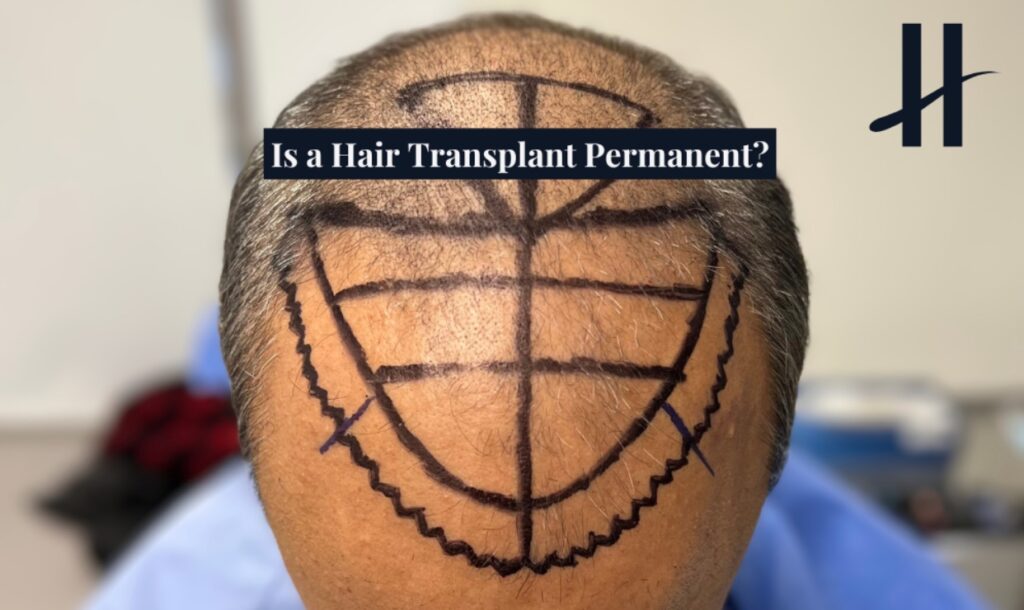Hair transplants have become a leading solution for individuals experiencing hair loss, offering a permanent path to restoring a fuller head of hair. But how permanent are these results? In this post, we’ll dive into the key factors influencing the longevity and permanence of hair transplants and what you need to consider before opting for surgery as a permanent hair restoration solution.
Understanding Hair Transplant Procedures
A hair transplant involves relocating hair follicles from one part of the body (known as the donor area) to thinning or balding areas (the recipient site). In a hair transplant, the most common donor areas are the sides and back of the head as the hair in those areas is less likely to be vulnerable to thinning. The two most common hair transplant techniques are Follicular Unit Excision (FUE) and Follicular Unit Transplantation (FUT).
FUE vs. FUT
-
FUE:
This method involves extracting individual hair follicles and implanting them into the thinning or balding area. There is typically minimal scarring and it offers a quicker recovery, making it a popular surgical choice.
-
FUT:
This technique involves removing a strip of scalp from the donor area, which is then dissected into individual follicular units. While it can yield a larger number of grafts and therefore, cover larger transplant areas, it does leave a linear scar. (A skilled surgeon can minimize this and depending on the length of a person’s hair – it is often hidden very easily.)
Factors Influencing Hair Transplant Permanence
Several factors play a role in determining the long-term success of your hair transplant and a qualified hair restoration specialist will cover these with you. The reality is, if you are considering a surgery and expecting certain results, you should have a very open and honest dialogue with your surgeon to ensure your individual factors are acknowledged and addressed. These are the top 5 factors we believe should be discussed:
Genetic Predisposition:
Your genetic makeup is a critical factor in determining the permanence of your hair transplant. If male-pattern baldness or female-pattern baldness runs in your family, you may continue to experience hair loss even after the procedure. Genetics don’t guarantee hair loss outcomes but understanding your genetic predisposition is essential in selecting the right hair restoration strategy. More a matter of working with your genetic predispositions than against them.
Donor Hair Quality:
The quality and quantity of donor hair are crucial for ensuring the success of your transplant. The donor hair should be healthy and sourced from a genetically stable area of your scalp to guarantee lasting results. If the donor hair is of poor quality, it can negatively affect the permanence of the transplant. This is why over-aggressive harvesting of grafts can be such a negative experience. If the quality of the graft is low – it doesn’t matter if you put hundreds of grafts into an area, they are unlikely to survive.
Surgical Techniques:
The skill and experience of the surgeon performing your hair transplant play a significant role in the procedure’s success and permanence. Advanced surgical techniques and choosing a reputable clinic with a proven track record are key to achieving long-lasting, natural-looking results. This is another reason why discount shopping is not a great idea when considering a hair transplant. Look for qualified, experienced surgeons who are happy to showcase results achieved with some of their other patients.
Post-Operative Care:
Proper post-operative care is essential for ensuring the longevity of your hair transplant and following your surgeon’s advice on hair care, medications, and physical activity after the procedure is vital for optimal healing and growth.
Hair Transplant Costs:
While a quality hair transplant can require a higher initial investment, it’s essential to weigh these costs against the benefits of a permanent solution. Opting for a high-quality procedure increases the likelihood of long-term, satisfactory results, making it a worthwhile investment. This is also why just inquiring about the cost per graft isn’t the best indicator of who you want doing your surgery.
Enhancing Hair Transplant Success
To improve the results of your hair transplant and ensure your hair transplant results are permanent, consider the following:
Complementary Hair Restoration Solutions:
Combining hair transplants with other hair restoration treatments like minoxidil or finasteride can help maintain the results and prevent further hair loss. These medications are effective at slowing hair loss and stimulating new growth.
Non-Surgical Hair Restoration:
Non-surgical treatments like Platelet-Rich Plasma (PRP) Therapy can enhance the results of your hair transplant by stimulating hair follicles and promoting growth. PRP involves injecting your platelets into the scalp to boost hair regeneration. PRP can also be used during surgery to soak the grafts pre-implant.
Post-Operative Follow-Up:
Having access to your hair transplant specialist is essential for both monitoring your progress and addressing any potential issues early, which greatly impact and ensure the long-term success of your hair transplant.
Healthy Lifestyle:
Maintaining a healthy lifestyle supports your hair transplant results. A balanced diet rich in essential vitamins and minerals like biotin, zinc, and iron can promote hair health. Avoiding excessive heat styling and chemical treatments will help preserve the longevity of your transplanted hair.
Hair Transplant Benefits
Hair transplants offer numerous benefits, including:
-
Permanent Hair Restoration:
When performed correctly and maintained with proper care, hair transplants provide a permanent solution to hair loss.
-
Natural Appearance:
Modern hair transplant techniques ensure that transplanted hair blends seamlessly with your natural hair, offering a natural and aesthetically pleasing appearance.
-
Boosted Self-Esteem:
A successful hair transplant can significantly improve your confidence, self-esteem, and overall quality of life.
Considerations Before Opting for a Hair Transplant
Before committing to a hair transplant, consider the following:
Hair Transplant Consultation:
A thorough consultation with a specialist is crucial to determine whether you’re a suitable candidate for a hair transplant. This consultation will include an evaluation of your medical history, hair loss pattern, genetic predispositions and expectations.
Surgical Techniques:
Understanding the differences between FUE vs FUT, as well as their respective benefits and limitations, is essential to making an informed decision. Discuss the best option with your surgeon based on your specific needs.
Post-Operative Expectations:
It’s important to set realistic expectations for the post-operative period. Discuss recovery times, potential side effects, and the timeframe for seeing full results with your surgeon before proceeding.
Hair Transplant Effectiveness:
While hair transplants are highly effective, individual results can vary. Factors such as age, hair type, and the extent of hair loss can all influence the overall success of the procedure.
Conclusion
Understanding the factors that affect the permanence of hair transplants is essential for making an informed decision. From considering the costs to ensuring proper post-operative care, each factor plays a critical role in achieving lasting, satisfying results. Consult with a specialist at Canada’s leading hair transplant clinic to explore your options and discover how we can help you achieve a fuller, permanent head of hair.
Schedule your consultation today to learn more about our range of hair restoration solutions and take the first step toward restoring your confidence.




